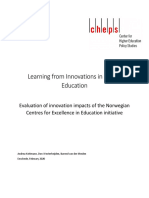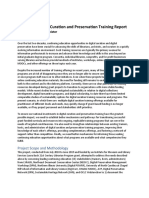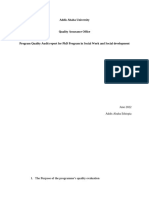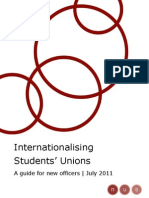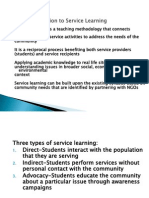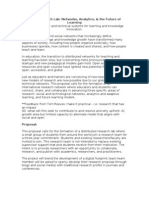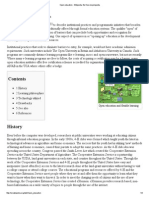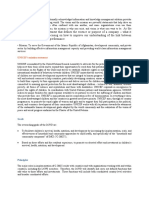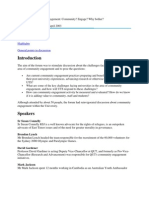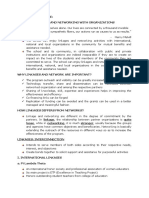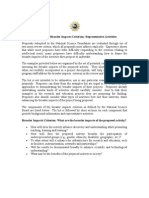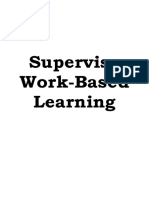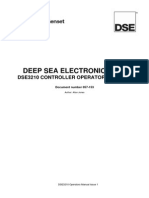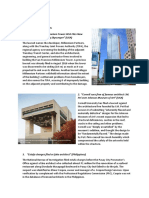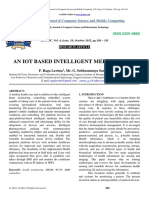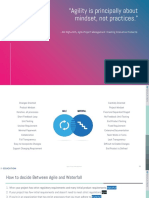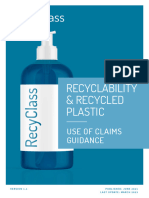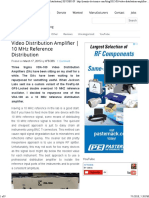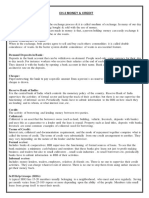0 ratings0% found this document useful (0 votes)
53 viewsACE U Profile Tool Brief v4
ACE U Profile Tool Brief v4
Uploaded by
Joviner Yabres LactamThe document describes a data collection tool called the ACE-U Profiling Tool that is used to capture the knowledge generation and community engagement practices of higher education institutions. The tool contains two tables. Table 1 collects information on the institutional support mechanisms that make the higher education institution accessible to the community. Table 2 collects information on the institution's ongoing community engagement programs and projects, including details on openness, participation, relevance, and knowledge generation. The document also provides definitions for various terms related to community engagement practices.
Copyright:
© All Rights Reserved
Available Formats
Download as DOCX, PDF, TXT or read online from Scribd
ACE U Profile Tool Brief v4
ACE U Profile Tool Brief v4
Uploaded by
Joviner Yabres Lactam0 ratings0% found this document useful (0 votes)
53 views5 pagesThe document describes a data collection tool called the ACE-U Profiling Tool that is used to capture the knowledge generation and community engagement practices of higher education institutions. The tool contains two tables. Table 1 collects information on the institutional support mechanisms that make the higher education institution accessible to the community. Table 2 collects information on the institution's ongoing community engagement programs and projects, including details on openness, participation, relevance, and knowledge generation. The document also provides definitions for various terms related to community engagement practices.
Original Description:
results
Copyright
© © All Rights Reserved
Available Formats
DOCX, PDF, TXT or read online from Scribd
Share this document
Did you find this document useful?
Is this content inappropriate?
The document describes a data collection tool called the ACE-U Profiling Tool that is used to capture the knowledge generation and community engagement practices of higher education institutions. The tool contains two tables. Table 1 collects information on the institutional support mechanisms that make the higher education institution accessible to the community. Table 2 collects information on the institution's ongoing community engagement programs and projects, including details on openness, participation, relevance, and knowledge generation. The document also provides definitions for various terms related to community engagement practices.
Copyright:
© All Rights Reserved
Available Formats
Download as DOCX, PDF, TXT or read online from Scribd
Download as docx, pdf, or txt
0 ratings0% found this document useful (0 votes)
53 views5 pagesACE U Profile Tool Brief v4
ACE U Profile Tool Brief v4
Uploaded by
Joviner Yabres LactamThe document describes a data collection tool called the ACE-U Profiling Tool that is used to capture the knowledge generation and community engagement practices of higher education institutions. The tool contains two tables. Table 1 collects information on the institutional support mechanisms that make the higher education institution accessible to the community. Table 2 collects information on the institution's ongoing community engagement programs and projects, including details on openness, participation, relevance, and knowledge generation. The document also provides definitions for various terms related to community engagement practices.
Copyright:
© All Rights Reserved
Available Formats
Download as DOCX, PDF, TXT or read online from Scribd
Download as docx, pdf, or txt
You are on page 1of 5
SAINT ESTANISLAO KOSTKA COLLEGE, INC.
Poblacion, Manukan, Zamboanga del Norte
7110 Philippines
www.sekc.org.ph
Adopted from ACE-U Profiling Tool (DAVAO UNIVERSITY)
The ACE U tool is a data entry spreadsheet for capturing the knowledge generation and community engagement practices of higher education institutions (HEI) in
their extension function.
The tool has two tables. The first table called Institutional support mechanisms to community engagement contains information about how the HEI makes itself
accessible to the community. The second table called Ongoing community engagements programs and projects contains information about how openness,
participation, relevance, and knowledge generation are practiced in projects.
Table 1: Institutional Support Mechanisms to Community Engagement
COLLEGE
As of JUNE 2014
Enrolment Community
Engagement
Units
Focus of
Outreach,
Advocacy, and
Partnerships
Budget for
Extension
Incentives to
Teachers/
Staff
Extension
Office
permanent
staff
Extension
Office
student
assistants
Institutional Competency
Guidance and
Counselling office
Table 2: Ongoing community engagement programs and projects (June 2012 to September 2013)
COLLEGE
Program
Projects
under
Program
Types of
Project
OPENNESS PARTICIPATION
Access Point Modes of
Engagement
Types of
Partnership
External Partners Participating Units
University
Program
Projects
under
Program
RELEVANCE COMMUNITY ENGAGEMENT AND KNOWLEDGE GENERATION
Focus of
Outreach,
Institutional
Competency
Research-
supported
Knowledge Product Knowledge Sharing Audience
Advocacy, and
Partnerships
Instructions for the June 9, 2014 forum
Please list the information requested under the following items:
A. Organizational Profile
1. The budget share (in percentage) of the HEIs extension office or its equivalent
2. A list of offices or centers that implement extension activities aside from the colleges
3. A list of subject/ course competencies or subject area specialization of the HEI
4. A list of development priorities (e.g. good governance, agriculture development)
5. Incentives to staff and students for participating in extension work
B. Projects Profile (This refers to the HEIs ongoing projects during the period June 2013 to March 2014. This should be a comprehensive list.)
1. A list of ongoing projects during the period June 2013 to March 2014
2. Project date start
3. Brief description of project and its objectives
4. Name of person or office who initiated the project
5. External partners of the HEI in implementing the project
6. Projects fund source
7. Partnership arrangement with the community (bring MOA or partnership agreement or any document that details this information)
8. No. of students and faculty participating in the project
9. Different HEI offices involved in the implementation of the project
10. Knowledge product/s of the project. Be specific. Ex: titles of studies, conceptual or systems designs, instruments, and tools. These do not
include project reports.
11. Knowledge sharing approaches of the project. Be specific. Ex: conference on Water Treatment by High Schools held on (date) in (venue) or
Uploading of activity report (Title of article or url address) in university website
12. Target audience or users of the projects knowledge product/s. Be specific. Ex: mothers of Barangay X.
13. Projects subject focus. Ex: Agriculture
14. Research work used by project to informed the project. Be specific. Ex: title of study conducted by the (name of college).
15. Projects community impact. Be specific. Ex: reduction of elementary school dropout rate from 4% to 2%.
Definition of Terms
Programs are sets of interrelated projects in support of specific institutional goals.
Projects are sets of activities undertaken within a fixed time period in support of specific objectives.
Types of Projects or Programs:
1. Curricular are undertaken in fulfillment of an academic requirement. For example, NSTP and service-learning.
2. Non-curricular are outreach, volunteer work, or other activities that do not form part of an academic requirement, and are funded by the university.
3. Externally funded are special projects undertaken by the university with funding from external sources.
ACE U stands for Approaches to Community Engagement of Universities. It is an approach to describe community engagement practices of universities in their
research or knowledge creation, instruction or knowledge sharing, and extension or knowledge application. The approach consists of three characteristics:
Access, Participation, and Relevance.
Access refers to the ways by which the university makes itself available to the community. For example, through staff who have contacts in the community.
Access Points:
1. Access through Staff/Student are channels through which the community approaches the university, specifically, through the teaching staff, non-
teaching staff, or students.
2. Access through Institution are direct links to the university, such as its offices and senior leadership. They could also be channels through which
projects are implemented as part of the universitys regular plan or budget for a given period.
Participation refers to the varying roles of the university and the community in projects or programs.
Types of Participation:
1. Service-oriented: University as provider of support, community as receiver. For example, material, human, technical.
2. Mutual exchange: University and community sharing information and resources.
3. Cooperative engagement: University and community co-implementing in some phases of the project.
4. Transformative engagement: Community taking leadership in decision-making, university providing necessary support to sustain a prior engagement.
Types of Partnerships:
1. Formal partnerships are those supported by a written agreement specifying the roles and responsibilities of the parties. For example, memorandum of
agreement or understanding.
2. Informal partnerships are those without a written agreement.
External partners are individuals or organizations that play a role in programs or projects. For example, an LGU providing training or an NGO providing logistical
support.
Participating units are offices, centers, colleges or departments in the university that have a role in programs or projects.
Relevance refers to how the university undertakes community engagement based on its trifocal functions of instruction, research, and extension.
Focus of outreach, advocacy, and partnership are areas pursued by the university as an institutional commitment or a development priority, which are not
necessarily institutional competencies. These can be in response to the needs of the community or a product of public consultation.
Institutional competencies are fields of specialization officially recognized by the Commission on Higher Education as centers of excellence and development.
They could also include academic programs granted accreditation the by Federation of Accrediting Agencies of the Philippines.
Research--supported are projects where research is used as an input in identification, design, implementation, monitoring, or evaluation, such as baseline study
or impact evaluation.
Community engagement is any university program, project, activity that involves the community.
Knowledge generation refers to ways of producing knowledge through the universitys trifocal functions of research or creating knowledge, instruction or
sharing knowledge, and extension or applying knowledge.
Knowledge products are processed information and data recorded in transferable form such as studies, reports, tools, and design.
Knowledge sharing are ways of communicating knowledge through various platforms such as public dialogues, mass media, and websites. In some cases, the
platforms could include communities of interest, for example, a university leader sharing a community issue in a national policy dialogue of educators.
Audience refers to the target users of a knowledge sharing activity.
Community engagement units are offices, centers, or departments in the university that are involved in community engagement.
Budget for Extension may come from the university or from an external source.
Incentives are monetary or non-monetary support for community engagement work provided by the university. For example, giving honorarium and reducing
teaching load in exchange for extension work.
You might also like
- (UPCRES 2021) A Primer On Communication and Media ResearchDocument181 pages(UPCRES 2021) A Primer On Communication and Media ResearchGlenn Bello100% (1)
- Values IntegrationDocument3 pagesValues IntegrationJoviner Yabres Lactam50% (4)
- Module 9 Linkages and Networking With OrganizationsDocument12 pagesModule 9 Linkages and Networking With OrganizationsQuenie De la Cruz83% (6)
- DepEd Order 8 S 2015Document35 pagesDepEd Order 8 S 2015Joviner Yabres Lactam50% (2)
- Topic 2 Extension As A Function of SUCDocument22 pagesTopic 2 Extension As A Function of SUCPca ZdnNo ratings yet
- Basic Education and Literacy Guidelines enDocument9 pagesBasic Education and Literacy Guidelines enjake_calderónNo ratings yet
- Teaching and Learning Center ProposalDocument26 pagesTeaching and Learning Center ProposalAbhishek RanaNo ratings yet
- Engl4183 Project C Final DraftDocument21 pagesEngl4183 Project C Final Draftapi-295530242No ratings yet
- Community Outreach Programs and Extension Servicesof The Pangasinan State UniversityDocument13 pagesCommunity Outreach Programs and Extension Servicesof The Pangasinan State UniversityJeff PereyrasNo ratings yet
- Developing and Implementing An Effective Public Outreach ProgramDocument5 pagesDeveloping and Implementing An Effective Public Outreach ProgramTamene AdugnaNo ratings yet
- Social Media Tactical PlanDocument3 pagesSocial Media Tactical Planapi-239576829No ratings yet
- Learning From Innovations in Higher Education 2020Document153 pagesLearning From Innovations in Higher Education 2020Rana KoshhaNo ratings yet
- MODULE 4 Implementating The CurriculumDocument7 pagesMODULE 4 Implementating The CurriculumFreda DayogNo ratings yet
- Ac 2011-275: Student Reflection in Experiential Learning ProjectsDocument12 pagesAc 2011-275: Student Reflection in Experiential Learning ProjectsPriyadarshini PandaNo ratings yet
- Sustaining Digital Curation and Preservation Training ReportDocument6 pagesSustaining Digital Curation and Preservation Training ReportViannisoNo ratings yet
- 2009-2014 Division of Student Affairs Strategic Plan: MissionDocument15 pages2009-2014 Division of Student Affairs Strategic Plan: MissionDominicSavioNo ratings yet
- Student Grant ApplicationDocument4 pagesStudent Grant Applicationapi-274648180No ratings yet
- Social Work and Social DevelopmentDocument17 pagesSocial Work and Social DevelopmentSewale AbateNo ratings yet
- Notes For New Su Officers 2011Document7 pagesNotes For New Su Officers 2011Shahzad MalikNo ratings yet
- 6571 AnswersDocument23 pages6571 AnswersArshad IqbalNo ratings yet
- Service LearningDocument5 pagesService LearningRahul PatelNo ratings yet
- UNU Global Communications Strategy - 2020 2024Document6 pagesUNU Global Communications Strategy - 2020 2024Luz CBNo ratings yet
- Research in The School of Architecture Dalhousie UniversityDocument4 pagesResearch in The School of Architecture Dalhousie UniversityRick LeBrasseurNo ratings yet
- Open Research Lab: Networks, Analytics, & The Future of LearningDocument8 pagesOpen Research Lab: Networks, Analytics, & The Future of LearningAlejandro UribeNo ratings yet
- Network LinkagesDocument3 pagesNetwork LinkagesAvonodOiratulc100% (2)
- The Plan For PlanningDocument5 pagesThe Plan For Planningbabita serra100% (2)
- Centre For Urban.Document7 pagesCentre For Urban.Vikrant ChaudharyNo ratings yet
- Innovations in Education June 20101Document10 pagesInnovations in Education June 20101Anca Nedelcu100% (1)
- Town and Gown ApproachDocument31 pagesTown and Gown Approachgerald sanchezNo ratings yet
- FA GuideDocument28 pagesFA GuidesarvaiyahimmatNo ratings yet
- University Outreach and Engagement Strategic PlanDocument5 pagesUniversity Outreach and Engagement Strategic PlanMona Wahba MadkourNo ratings yet
- Rizza Balangue Revised Chapter I IIIDocument33 pagesRizza Balangue Revised Chapter I IIIMark De GuzmanNo ratings yet
- Open Education - WikipediaDocument3 pagesOpen Education - WikipediakasifinanceNo ratings yet
- Perold and Omar Communityty Service Concept PaperDocument131 pagesPerold and Omar Communityty Service Concept PaperCollince OchiengNo ratings yet
- 1.3 Policies, Procedures, Programs & Funding - Research, Recommend, and Implement PoliciesDocument2 pages1.3 Policies, Procedures, Programs & Funding - Research, Recommend, and Implement Policiesapi-533548625No ratings yet
- New York Campus Compact Weekly: Service-Learning Faculty InstituteDocument7 pagesNew York Campus Compact Weekly: Service-Learning Faculty InstituteMarianne Reeves RidleyNo ratings yet
- ToR RDI Internship ProgramDocument4 pagesToR RDI Internship ProgramBagus Sukma PutraNo ratings yet
- Proposal WritingsDocument3 pagesProposal WritingsMohammad NaeemNo ratings yet
- NSTP Proposal - Group 4Document2 pagesNSTP Proposal - Group 4Cristelle Mae MarvillaNo ratings yet
- Living Values ProspectusDocument5 pagesLiving Values ProspectusyumiNo ratings yet
- Terms of Reference (Project Brief) - "What Are We Going To Do?"Document8 pagesTerms of Reference (Project Brief) - "What Are We Going To Do?"syed amir aliNo ratings yet
- Speakers Highlights General Points in Discussion: SR Susan ConnellyDocument9 pagesSpeakers Highlights General Points in Discussion: SR Susan ConnellyRohm JavNo ratings yet
- Teacher Competence - Linkages and Networking With OrganizationDocument5 pagesTeacher Competence - Linkages and Networking With OrganizationEldrian Louie ManuyagNo ratings yet
- Impacts Arising From Public Engagement Discussion Paper 0Document10 pagesImpacts Arising From Public Engagement Discussion Paper 0Dhanica Delos Santos DomdomNo ratings yet
- NSTP 2 2Document28 pagesNSTP 2 2Hazel Mae PangilinanNo ratings yet
- The Student Engagement GuideDocument9 pagesThe Student Engagement GuideAmanda L ShoreNo ratings yet
- Hdpmoduleone1 231009092355 606640c1Document120 pagesHdpmoduleone1 231009092355 606640c1Bekuma GemechuNo ratings yet
- Broader Impacts Examples From NSFDocument5 pagesBroader Impacts Examples From NSFjoedriscNo ratings yet
- Level 3-Phase 2 Survey VisitDocument30 pagesLevel 3-Phase 2 Survey VisitBryNo ratings yet
- Proposal For A School of Information Management and SystemsDocument16 pagesProposal For A School of Information Management and SystemsAnabia ChodryNo ratings yet
- Project Deep Narrative ReportDocument2 pagesProject Deep Narrative ReportDianaRoseAcupeado100% (1)
- Handbook 2Document52 pagesHandbook 2Huy TrầnNo ratings yet
- Linkages Final Aug 29Document55 pagesLinkages Final Aug 29Yaj CruzadaNo ratings yet
- NSTP-CWTS 2 Chapter 2Document13 pagesNSTP-CWTS 2 Chapter 2Jaymark Enoy75% (4)
- Alicia's PosterDocument1 pageAlicia's PosterJacqueline WarrellNo ratings yet
- Linkages and Networking (Written Report - Cuasay)Document11 pagesLinkages and Networking (Written Report - Cuasay)Cuasay, Vernelle Stephanie De guzmanNo ratings yet
- University of Cincinnati Social Media StrategyDocument7 pagesUniversity of Cincinnati Social Media StrategyBhekithemba DlaminiNo ratings yet
- NaccDocument13 pagesNaccTamil SelviNo ratings yet
- Project Proposal: By: Mary Ann Refugio Aim Rubia Cherah Dahilog Girly Serino Rave Ryan GuillermoDocument9 pagesProject Proposal: By: Mary Ann Refugio Aim Rubia Cherah Dahilog Girly Serino Rave Ryan GuillermoAim RubiaNo ratings yet
- Chapter 1 3 Impact of The Community Extension Program of The College of Teacher 2 2Document76 pagesChapter 1 3 Impact of The Community Extension Program of The College of Teacher 2 2jeanetteanneborje0No ratings yet
- Ten Strategies for Building Community with Technology: A Handbook for Instructional Designers and Program DevelopersFrom EverandTen Strategies for Building Community with Technology: A Handbook for Instructional Designers and Program DevelopersNo ratings yet
- Faculty Development Programs: Applications in Teaching and LearningFrom EverandFaculty Development Programs: Applications in Teaching and LearningNo ratings yet
- 2004 Division Orals Metrobank-MTAP-NCR Math Challenge Grade 3Document2 pages2004 Division Orals Metrobank-MTAP-NCR Math Challenge Grade 3Joviner Yabres Lactam100% (1)
- Division Memo No. 468 S. 2017 Classroom Observation Tool For School HeadsDocument4 pagesDivision Memo No. 468 S. 2017 Classroom Observation Tool For School HeadsJoviner Yabres LactamNo ratings yet
- Dear Colleague: Deo Gratias!: Josephrefugio@svc - Edu.phDocument1 pageDear Colleague: Deo Gratias!: Josephrefugio@svc - Edu.phJoviner Yabres LactamNo ratings yet
- Phil 201: Critical Thinking SyllabusDocument3 pagesPhil 201: Critical Thinking SyllabusJoviner Yabres LactamNo ratings yet
- The Importance of Data-Based Decision Making: VignetteDocument11 pagesThe Importance of Data-Based Decision Making: VignetteJoviner Yabres LactamNo ratings yet
- Saint Estanislao Kostka College, IncDocument4 pagesSaint Estanislao Kostka College, IncJoviner Yabres LactamNo ratings yet
- 2004 Division Orals Metrobank-MTAP-NCR Math Challenge Grade 3Document2 pages2004 Division Orals Metrobank-MTAP-NCR Math Challenge Grade 3Joviner Yabres Lactam100% (1)
- Table of SpecificationDocument45 pagesTable of SpecificationJoviner Yabres LactamNo ratings yet
- Deped Order No.8, S.2015: Policy Guidelines On Classroom Assessment For The K To 12 Basic Education Program (Bep)Document35 pagesDeped Order No.8, S.2015: Policy Guidelines On Classroom Assessment For The K To 12 Basic Education Program (Bep)Joviner Yabres LactamNo ratings yet
- Updated CDO Research Manual CdoDocument64 pagesUpdated CDO Research Manual CdoJoviner Yabres Lactam100% (2)
- Principles of TeachingDocument49 pagesPrinciples of TeachingJoviner Yabres LactamNo ratings yet
- Teacing Approach Method and TechniquesDocument36 pagesTeacing Approach Method and TechniquesJoviner Yabres Lactam100% (1)
- What Is Your Teaching StyleDocument8 pagesWhat Is Your Teaching StyleJoviner Yabres LactamNo ratings yet
- Planning Mutiple IntelligencesDocument3 pagesPlanning Mutiple IntelligencesJoviner Yabres LactamNo ratings yet
- Facilitate Learning SessionDocument8 pagesFacilitate Learning SessionJoviner Yabres LactamNo ratings yet
- Supervise Work BasedDocument13 pagesSupervise Work BasedJoviner Yabres Lactam50% (2)
- DepEd Legal Matters Frequently Asked Questions (FAQs) - TeacherPHDocument6 pagesDepEd Legal Matters Frequently Asked Questions (FAQs) - TeacherPHJoviner Yabres LactamNo ratings yet
- Statistics Initial Release June 13Document82 pagesStatistics Initial Release June 13Joviner Yabres Lactam67% (3)
- General MethodDocument17 pagesGeneral MethodJoviner Yabres LactamNo ratings yet
- What Is K-PsepDocument9 pagesWhat Is K-PsepJoviner Yabres Lactam100% (1)
- Application Form - CEAP-SACREDDocument1 pageApplication Form - CEAP-SACREDJoviner Yabres LactamNo ratings yet
- Pnu AcesDocument3 pagesPnu AcesJoviner Yabres Lactam100% (1)
- Values Education Website by Nonette MarteDocument12 pagesValues Education Website by Nonette MarteJoviner Yabres LactamNo ratings yet
- Activity ThreeDocument6 pagesActivity ThreeJoviner Yabres LactamNo ratings yet
- Dse3210 ManualDocument32 pagesDse3210 Manualabuzer1981No ratings yet
- Pgurl Pgurl Product - Doidar0140atDocument2 pagesPgurl Pgurl Product - Doidar0140atadamNo ratings yet
- Perforation Varieties Can Make The DifferenceDocument4 pagesPerforation Varieties Can Make The DifferenceSabah SalihNo ratings yet
- Test Report 2.2 According To EN 10204: 2005-01: Declaration of Test and ConformityDocument1 pageTest Report 2.2 According To EN 10204: 2005-01: Declaration of Test and ConformityMuhammad TariqNo ratings yet
- Arch 158 HWDocument2 pagesArch 158 HWNilo Mateo BunaoNo ratings yet
- Baliwag Transit, Inc. vs. Court of AppealsDocument2 pagesBaliwag Transit, Inc. vs. Court of AppealsAlmer TinapayNo ratings yet
- Iot Based Intelligent Medicine BoxDocument6 pagesIot Based Intelligent Medicine BoxAkshay PatilNo ratings yet
- Thompson Stalking DocsDocument34 pagesThompson Stalking DocsCatalin Cimpanu [ZDNet]No ratings yet
- Commission AgreementDocument2 pagesCommission AgreementD. GoringotNo ratings yet
- AlphaESS - Storion-T50100 Battery Installation Manual - V2Document45 pagesAlphaESS - Storion-T50100 Battery Installation Manual - V2kapsethdceNo ratings yet
- CET203 FLUID MECHANICS AND HYDRAULICS, December 2020Document3 pagesCET203 FLUID MECHANICS AND HYDRAULICS, December 2020cedayan418No ratings yet
- 0X. - Agile Project Management - OUTDocument13 pages0X. - Agile Project Management - OUTNanang ZarmaNo ratings yet
- NG-018-D1-PNL-406701 - Rev06 UnsignedDocument111 pagesNG-018-D1-PNL-406701 - Rev06 UnsignedFolarin AyodejiNo ratings yet
- Code Qualification Gross SalaryDocument6 pagesCode Qualification Gross SalaryLatoya ThompsonNo ratings yet
- RecyClass Use of Claims GuidanceDocument28 pagesRecyClass Use of Claims GuidanceJulieta Molinari GomezNo ratings yet
- First Customer ContactDocument5 pagesFirst Customer ContactAshish NalavadeNo ratings yet
- Academic Calender 2022-23Document3 pagesAcademic Calender 2022-23KAMISETTI NAGA RAVI TEJA DURGA PRASADNo ratings yet
- Theories of ImperialismDocument8 pagesTheories of ImperialismKelvin GuptaNo ratings yet
- 10-6.Self-Diagnosis by Remote Controller (Check Code)Document3 pages10-6.Self-Diagnosis by Remote Controller (Check Code)AriesNo ratings yet
- Autopilot: SeriesDocument7 pagesAutopilot: Seriestolma4vNo ratings yet
- Illegal Dispossession ActDocument10 pagesIllegal Dispossession Actpurchaseland2No ratings yet
- Sigma VDA-100A Distribution AmpDocument9 pagesSigma VDA-100A Distribution AmpdonsterthemonsterNo ratings yet
- Modelling of Bang Bang PDDocument141 pagesModelling of Bang Bang PDRakesh KumarNo ratings yet
- Resume - CA7 SchedulerDocument5 pagesResume - CA7 SchedulerAsim JavedNo ratings yet
- Working Capital Management of Construction Supplies in District I of BatangasDocument68 pagesWorking Capital Management of Construction Supplies in District I of BatangasPatricia Mae BendañaNo ratings yet
- Money - Credit Class 10Document1 pageMoney - Credit Class 10Legendary Pokemon Blaster 2406No ratings yet
- Carstas de Solicitud de EmpleoDocument3 pagesCarstas de Solicitud de EmpleoMary ChanNo ratings yet
- PGP14 T3 HRM S1Document9 pagesPGP14 T3 HRM S1Aryan BokdeNo ratings yet
- Hanbilliob Sulfuric Acdi CatalystDocument5 pagesHanbilliob Sulfuric Acdi CatalystMahesh KumarNo ratings yet











